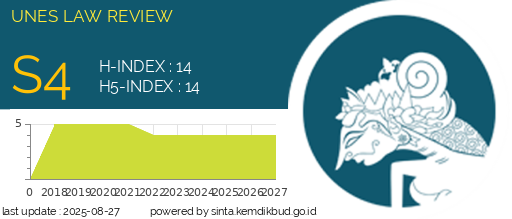Pertanggungjawaban Notaris Sebagai Pembuat Akta Wasiat (Testament Acte) Yang Tidak Memenuhi Ketentuan Legitieme Portie
DOI:
https://doi.org/10.31933/unesrev.v7i1.2318Keywords:
The Heirs, Testament, Legitieme Portie.Abstract
The death of an heir has created rights for their heirs to control and/or obtain the inheritance of the deceased. According to the Western Law of Inheritance, there are two ways to inherit a portion of the deceased's estate: according to the provisions of the law and as designated in a testament. In the formation of a testament, the role of a notary is important and crucial. This is because a notary can oversee, provide advice so that the content of the heir's testament does not contradict the law. One of the rules that must not be violated in the creation of a testament is regarding the absolute rights of the heirs or legitimate portion as regulated in Article 913 of the Civil. However, in reality, there are still testaments that violate the provisions of the legitimate portion from one or all of the heirs even though the testament has been made by or before a notary. This has undoubtedly caused injustice to the heirs, and more severely, the validity of a testament is then questioned as to whether it complies with the existing laws or contravenes statutory regulations. In writing this journal, the author uses a normative juridical method, which is an approach based on primary legal materials by examining various theories, concepts, legal principles, and regulations related to this research.
Downloads
References
Kitab Undang-Undang Hukum Perdata [Burgerlijke Wetboek]. Diterjemahkan oleh R. Subekti dan R. Tjitrosudibio.
Undang-Undang tentang Jabatan Notaris. UU Nomor 30 Tahun 2004. LN Tahun 2004 No. 117, TLN No. 4432. Sebagaimana diubah terakhir oleh UU Nomor 2 Tahun 2014 tentang Perubahan atas Undang-Undang Nomor 30 Tahun 2004 tentang Jabatan Notaris. LN Tahun 2014 No. 3, TLN No. 5491.
Adi, Rianto, Penelitian Sosial dan Hukum, Jakarta: Yayasan Pustaka Obor, 2021
Adjie, Habib, Hukum Notaris Indonesia, Tapsir Tematik Terhadap Undang-Undang No. 30 Tahun 2004 tentang Jabatan Notaris, Bandung: Refika Aditama, 2008.
Mertokusumo, Sudiko, Hukum Acara Perdata Indonesia, Jakarta: Liberty, 1982.
Soekanto, Soerjono dan Sri Mamudji, Penelitian Hukum Normatif: Suatu Tinjauan Singkat, Jakarta: Rajawali Pers, 2001.
Subekti, Pokok-Pokok Hukum Perdata, Bandung: Intermesa, 1997.
Subekti, R. dan dan Tjitrosodibio, Kamus Hukum, Jakarta: PT Pradnya Paramitha, 1996.
Suparman, Eman, Intisari Hukum Waris Indonesia, Bandung: Mandar Maju, 1991.
Tedjosaputro, Liliana, Etika Profesi Notaris Dalam Penegakan Hukum Pidana, Yogyakarta: Bigraf Pusblishing, 1995.
Wignjo, Sri Soemantri Martoe, Hukum Waris Indonesia, Bandung: Rafika Aditama, 1985.
Nasution, Adelia, “Pluralisme Hukum Waris di Indonesia”, Al-Qadhâ, Vol. 5, No. 1 (2018).
Downloads
Published
How to Cite
Issue
Section
License
Hak cipta :
Penulis yang mempublikasikan manuskripnya di jurnal ini menyetujui ketentuan berikut:
- Hak cipta pada setiap artikel adalah milik penulis.
- Penulis mengakui bahwa UNES Law Review berhak menjadi yang pertama menerbitkan dengan lisensi Creative Commons Attribution 4.0 International (Attribution 4.0 International CC BY 4.0) .
- Penulis dapat mengirimkan artikel secara terpisah, mengatur distribusi non-eksklusif manuskrip yang telah diterbitkan dalam jurnal ini ke versi lain (misalnya, dikirim ke repositori institusi penulis, publikasi ke dalam buku, dll.), dengan mengakui bahwa manuskrip telah diterbitkan pertama kali di Jurnal UNES Law Review.



















